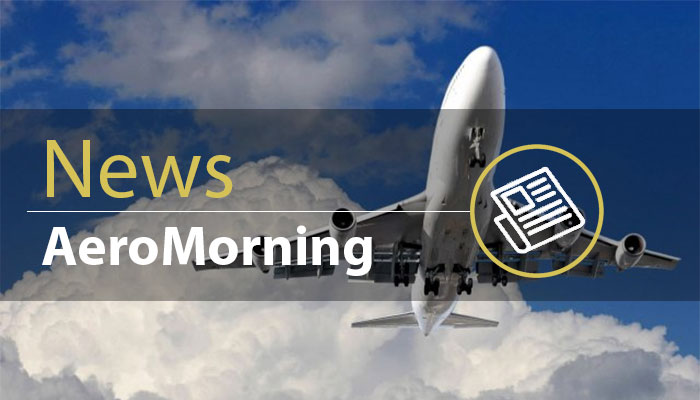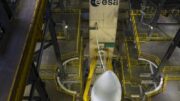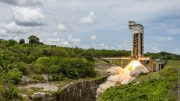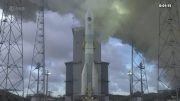The first launch of Ariane 6 is targeted for 9 July 2024 from Europe’s Spaceport in French Guiana, ESA Director General Josef Aschbacher announced at the ILA Berlin Air Show today.
Josef Aschbacher was joined by the Ariane 6 Task Force partners, ArianeGroup CEO Martin Sion, CNES CEO Philippe Baptiste and Arianespace CEO Stéphane Israël on stage to announce this milestone.
Walther Pelzer, Director General of the German Space Agency at DLR, was also present for the occasion.
Ariane 6 is Europe’s new heavy lift launch vehicle replacing its extremely successful predecessor, Ariane 5. Modular and agile, Ariane 6 has a reignitable upper stage allowing it to launch multiple missions on different orbits on a single flight.
ESA Director General Josef Aschbacher said: “Ariane 6 marks a new era of autonomous, versatile European space travel. This powerful rocket is the culmination of many years of dedication and ingenuity from thousands across Europe, and as it launches, it will re-establish Europe’s independent access to space. I am glad to announce that the first launch attempt will be on 9 July. I would like to thank the teams on the ground for their tireless hard work, teamwork and dedication in this last stretch of the inaugural launch campaign. Ariane 6 is Europe’s rocket for the needs of today, adaptable to our future ambitions.”
For the development of Ariane 6, ESA is the Launch System Architect working with prime contractor ArianeGroup for the development of the launch vehicle and with CNES for the development of the ground segment. ESA is the operator responsible for the inaugural flight while for subsequent flights Arianespace is the launch service provider that markets and operates the Ariane 6 launcher for institutional and commercial customers to launch a variety of missions into orbit.
“The announcement of the scheduled date for Ariane 6’s first flight puts us on the home stretch of the launch campaign and we are fully engaged in completing the very last steps. This flight will mark the culmination of years of development and testing by the teams at ArianeGroup and its partners across Europe. It will pave the way for commercial operations and a significant ramp-up over the next two years. Ariane 6 is a powerful, versatile and scalable launcher that will ensure Europe’s autonomous access to space,” said Martin Sion, CEO of ArianeGroup.
“Once again, the announcement of the inaugural flight date of Ariane 6 from the Guiana Space Center is a crucial step towards European sovereignty in terms of access to space. Reaching this date was made possible thanks to the colossal efforts of all entities in the home stretch. I would like to pay tribute the collective achievement of overcoming the pitfalls over the months. Now to the final adjustments before launch. Europe in space is ready for take-off : we’re all united behind Ariane 6!” exclaimed Philippe Baptiste, CEO of CNES.
“With 30 missions in our order book, Ariane 6 has already gained the trust of institutional and commercial customers. We are preparing to make Ariane 6’s second launch by the end of the year, followed by a steady rise to around ten launches a year once we reach cruising speed. It represents a splendid challenge for Arianespace and our partners”, added Stéphane Israël, CEO of Arianespace.
At Europe’s Spaceport in French Guiana, many and varied payloads have been integrated on Ariane 6’s payload carrier. The last major milestone before launch is the wet dress rehearsal. Once this activity has been completed, the Ariane 6 Task Force will provide a joint update on the inaugural flight.
About the European Space Agency
The European Space Agency (ESA) provides Europe’s gateway to space.
ESA is an intergovernmental organisation, created in 1975, with the mission to shape the development of Europe’s space capability and ensure that investment in space delivers benefits to the citizens of Europe and the world.
ESA has 22 Member States: Austria, Belgium, the Czech Republic, Denmark, Estonia, Finland, France, Germany, Greece, Hungary, Ireland, Italy, Luxembourg, the Netherlands, Norway, Poland, Portugal, Romania, Spain, Sweden, Switzerland and the United Kingdom. Latvia, Lithuania, Slovakia and Slovenia are Associate Members.
ESA has established formal cooperation with four Member States of the EU. Canada takes part in some ESA programmes under a Cooperation Agreement.
By coordinating the financial and intellectual resources of its members, ESA can undertake programmes and activities far beyond the scope of any single European country. It is working in particular with the EU on implementing the Galileo and Copernicus programmes as well as with Eumetsat for the development of meteorological missions.
Learn more about ESA at www.esa.int









Be the first to comment on "Ariane 6 inaugural launch targeted for 9 July"